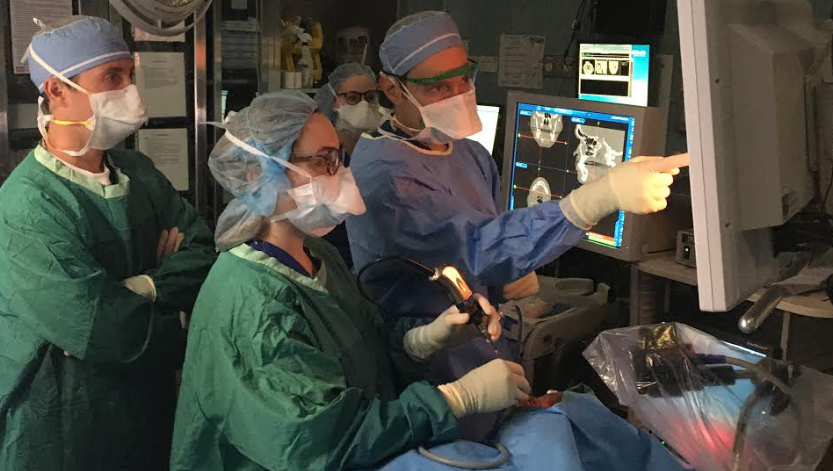Exploring the Field of Otolaryngology: What to Anticipate When You Seek Advice From an ENT
Otolaryngology, generally described as ENT, incorporates the medical diagnosis and treatment of nose, ear, and throat conditions. For those experiencing associated issues, consulting an ENT professional can offer clarity and alleviation. Comprehending what to expect during such examinations is important for reliable interaction and treatment. This summary will certainly describe key facets of the ENT experience, consisting of typical factors for sees and the procedures involved in medical diagnosis and treatment.

Recognizing Otolaryngology: A Summary
Otolaryngology, typically referred to as ENT (Nose, throat, and ear) medication, is a specific branch of medicine that concentrates on the diagnosis and therapy of problems influencing these essential locations of the body. This field includes a vast array of disorders, including those related to hearing, balance, breathing function, and speech. Otolaryngologists are educated to manage both clinical and medical therapies, making use of innovative methods and innovations. Their expertise prolongs beyond typical conditions, resolving issues such as allergies, sinus infections, and hearing loss. Furthermore, they play a critical function in the management of head and neck cancers cells, supplying comprehensive care tailored to specific client needs. Overall, otolaryngology remains necessary for preserving health and high quality of life in damaged individuals.
Usual Reasons to See an ENT Expert
Many people seek the proficiency of an ENT specialist for a range of reasons, mirroring the diverse nature of conditions that impact the nose, throat, and ear. Typical issues include persistent sinusitis, which commonly leads to persistent nasal blockage and face discomfort. Allergies and their linked symptoms, such as itching and sneezing, likewise motivate sees to these professionals (Otolaryngologist). Hearing loss, whether unexpected or gradual, is one more substantial reason for consultation. On top of that, individuals may seek examination for throat disorders, consisting of relentless hoarseness or swallowing problems. Sleep apnea, identified by disrupted breathing throughout rest, is frequently dealt with by ENT professionals too. Each of these conditions highlights the relevance of specialized care in taking care of complex ENT-related wellness concerns
Preparing for Your ENT Visit
When preparing for an ENT consultation, it is important to gather relevant details and think about any kind of specific issues. People need to compile an in-depth case history, consisting of previous ear, nose, or throat concerns, surgeries, and existing medicines. Recording signs and symptoms-- such as regularity, period, and severity-- can supply beneficial insights for the ENT professional. Furthermore, people ought to prepare a checklist of inquiries they desire to ask, making sure that all concerns are resolved during the see. Bringing along any pertinent clinical documents or examination outcomes can additionally aid the ENT in understanding the individual's problem. Patients must validate their consultation information, consisting of location, day, and time, to minimize any final confusion. Correct preparation can improve the performance of the examination and lead to far better end results.
What to Expect During the Consultation
As the consultation starts, the individual can expect to participate in a thorough discussion with the ENT specialist concerning their signs and symptoms and case history. The professional will ask about the period, frequency, and intensity of signs and symptoms such as hearing loss, nasal blockage, or sore throat. In addition, the individual's previous medical conditions, drugs, and any relevant family history will certainly be evaluated, helping the professional in forming a full understanding of the person's health and wellness. The ENT might also ask about way of living elements, such as direct exposure to allergens or irritants. This open discussion establishes a foundation for the assessment, ensuring that the individual's issues are attended to and establishing the stage for any essential examinations or recommendations for therapy.
Diagnostic Examinations and Treatments in Otolaryngology
A series of diagnostic tests and treatments are essential in otolaryngology to properly assess and detect conditions influencing the ear, throat, and nose. Common tests include audiometry, which gauges hearing function, and tympanometry, evaluating center ear stress. Nasal endoscopy enables visualization of the nasal flows and sinuses, while laryngoscopy analyzes the throat and vocal cables. Imaging methods, such as CT scans and MRIs, offer detailed views of head and neck structures. Allergic reaction screening may likewise be carried out to identify triggers for sinus or respiratory system concerns. These diagnostic tools allow ENT experts to create an extensive understanding of clients' conditions, ensuring customized and effective administration plans. Proper diagnosis is necessary for successful therapy results in otolaryngology.
Therapy Options Supplied by ENT Specialists
ENT specialists provide a range of therapy options customized to deal with details problems influencing the throat, ear, and nose. These therapies vary from traditional strategies, such as drug and way of life adjustments, to even more invasive procedures. Allergies may be handled with antihistamines or immunotherapy, while persistent sinusitis may require nasal corticosteroids or sinus surgical treatment. For hearing loss, ENT professionals frequently advise listening device or surgical treatments like cochlear implants. In instances of throat problems, alternatives can include speech therapy or operations to get rid of blockages. Additionally, they might give assistance for handling sleep apnea, consisting of the usage of CPAP tools or medical treatments. In general, the goal is to enhance individuals' quality of life with personalized treatment and efficient therapy methods.
When to Seek Follow-Up Care With an ENT
When to look for follow-up care with an ENT professional is essential for handling ongoing signs or problems connected to throat, ear, and nose conditions, lions hearing acknowledging. Patients should take into consideration scheduling a follow-up appointment if signs and symptoms continue despite preliminary therapy, such as persistent ear pain, nasal blockage, or throat pain. Modifications in hearing, balance problems, or uncommon nasal discharge may additionally require more evaluation. Furthermore, if a patient experiences side results from prescribed medicines or has actually undergone an operation, follow-up care is essential to keep track of recuperation and address any type of problems. Prompt appointments can ensure efficient monitoring of problems, avoid possible complications, and give tranquility of mind blog here pertaining to one's wellness. Looking for follow-up treatment promotes proactive health administration in otolaryngology.
Frequently Asked Concerns

What Certifications Should I Search for in an ENT Specialist?
When looking for an ENT specialist, one must try to find board certification, appropriate experience, and solid person testimonials. Additionally, reliable communication abilities and a compassionate strategy can significantly boost the overall therapy experience.
Just how Do I Choose the Right ENT for My Demands?
Picking the appropriate ENT professional entails examining their certifications, experience, and patient testimonials (Otolaryngologist). It is vital to consider their communication style and strategy to therapy, ensuring they straighten with the individual's specific health needs and choices
Exist Any Kind Of Risks Connected With ENT Procedures?
The risks related to ENT procedures may consist of infection, blood loss, anesthetic difficulties, and prospective damages to bordering frameworks. People should go over these threats with their medical professional to understand private concerns and guarantee notified choices.
Just How Can I Manage Anxiety Before My ENT Consultation?
To take care of anxiousness prior to an appointment, people can practice deep breathing workouts, picture favorable end results, prepare questions in advancement, and look for assistance from good friends or household, fostering a feeling of reassurance and calmness.
What Should I Do if I Experience Negative Effects From Therapy?
The person must quickly report them to their health care supplier if side impacts from treatment take place. Modifications to therapy or added interventions may be essential to assure safety and effectiveness in handling their problem - Voice. As the assessment begins, the individual can expect to involve in an extensive conversation with read what he said the ENT expert regarding their symptoms and medical history. These analysis tools allow ENT professionals to develop a detailed understanding of clients' problems, making sure tailored and reliable administration plans. ENT specialists supply a range of treatment choices customized to deal with certain conditions impacting the ear, throat, and nose. When looking for an ENT expert, one need to look for board qualification, pertinent experience, and solid individual reviews. Choosing the best ENT expert includes evaluating their credentials, experience, and client evaluations
Comments on “Latest Trends in Otolaryngology: What Patients Should Know”